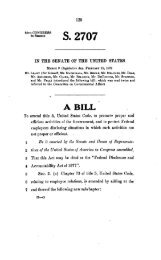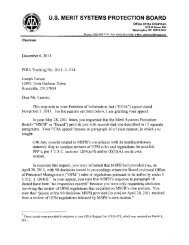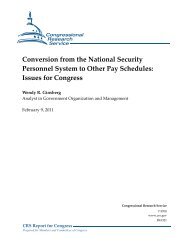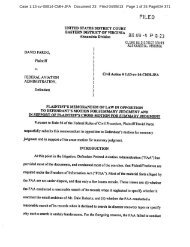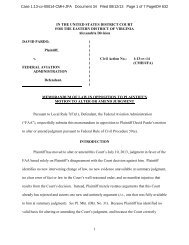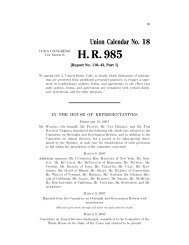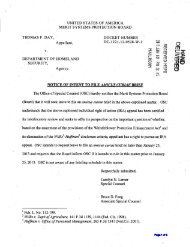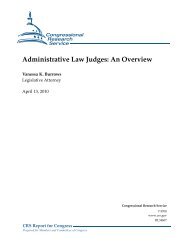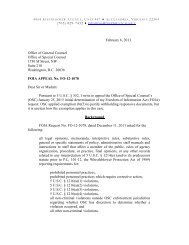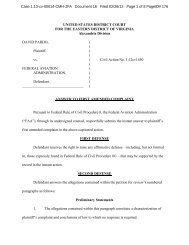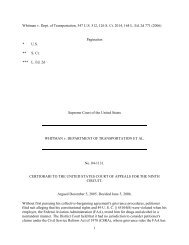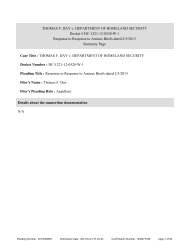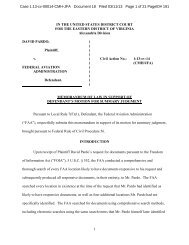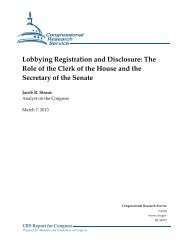The Fair Labor Standards Act (FLSA): An Overview - MSPB Watch
The Fair Labor Standards Act (FLSA): An Overview - MSPB Watch
The Fair Labor Standards Act (FLSA): An Overview - MSPB Watch
You also want an ePaper? Increase the reach of your titles
YUMPU automatically turns print PDFs into web optimized ePapers that Google loves.
<strong>The</strong> <strong>Fair</strong> <strong>Labor</strong> <strong>Standards</strong> <strong>Act</strong> (<strong>FLSA</strong>): <strong>An</strong> <strong>Overview</strong>In 1937, the United States was recovering from the Great Depression. As part of the recoveryeffort, President Franklin D. Roosevelt endorsed a series of economic programs, known as theNew Deal, to help stimulate and rebuild the U.S. economy. <strong>The</strong> National Industrial Recovery<strong>Act</strong> (NIRA) was the major statute enacted to help achieve these goals. Although the NIRA waseventually found unconstitutional, many of its provisions appeared in later New Deal statutes,including in the <strong>Fair</strong> <strong>Labor</strong> <strong>Standards</strong> <strong>Act</strong> of 1938 (<strong>FLSA</strong>). 1Working Families Flexibility <strong>Act</strong> of 2013On April 9, 2013, Representative Martha Roby introduced H.R. 1406, the Working FamiliesFlexibility <strong>Act</strong> of 2013. <strong>The</strong> Subcommittee on Workforce Protections of the House Committee onEducation and the Workforce held a hearing on the bill on April 11, 2013. <strong>The</strong> full committeefavorably reported the legislation, as amended, to the House on April 30, 2013. <strong>The</strong> bill waspassed by the House by a vote of 223-204 on May 8, 2013. In the Senate, the measure wasreferred to the Committee on Health, Education, <strong>Labor</strong>, and Pensions (HELP).<strong>The</strong> <strong>FLSA</strong> requires employers to pay covered, nonexempt workers at least one-and-a-half timestheir regular hourly wage for hours worked in excess of 40 hours in a week. H.R. 1406 wouldamend the <strong>FLSA</strong> to allow private sector employers to offer employees compensatory time off(i.e., “comp” time) in place of overtime pay. Employees would receive at least one and a halfhours of paid comp time for each hour of overtime worked.<strong>The</strong> use of comp time would be optional for both employers and employees. Employers couldprovide comp time to employees under the provisions of a collective bargaining agreement orunder an agreement between an employer and employee. <strong>An</strong> employee could choose to accept orreject an offer of comp time. <strong>An</strong> employee may withdraw from a comp time agreement at anytime. <strong>An</strong> employer may withdraw from a comp time agreement with 30 days notice.Employees would be eligible for comp time if they have worked at least 1,000 hours for theiremployer in a period of continuous employment in the year before agreeing to or receiving comptime. Employees could accumulate up to 160 hours of comp time. <strong>An</strong> employee who requests touse comp time would be permitted to take time off within “a reasonable period” after making therequest if the use of comp time does not “unduly disrupt” the employer’s operations.Under the act, several circumstances would trigger the conversion of accrued comp time into amonetary payment:• At the end of each calendar year (or at the conclusion of another specified 12-month period), an employer must provide monetary compensation for any unusedcomp time.• <strong>An</strong> employee may request accrued comp time to be converted to monetarypayment at any time. <strong>The</strong> employer must comply with this request within 30days.• <strong>An</strong> employer, with 30 days notice, may convert any accrued comp time in excessof 80 hours to a monetary payment.1 Stephanie Fitzgerald, <strong>The</strong> New Deal: Rebuilding America (Minneapolis, MN: Compass Point Books, 2007), p. 77.Congressional Research Service 1



